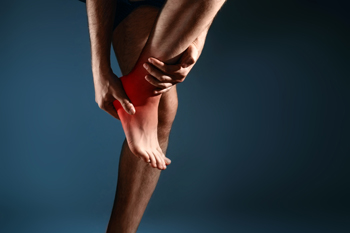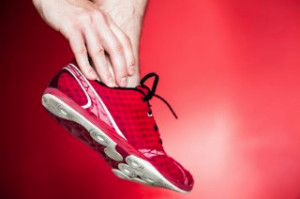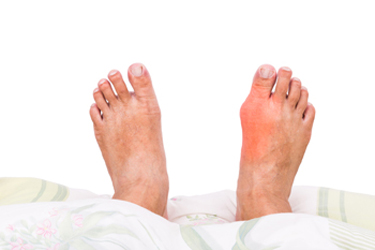
 The heel is the largest bone in the foot, and pain occurring in either the front, back, or bottom of it can sometimes be debilitating. Foot abnormalities, wearing ill-fitting shoes, and injury are all possible causes of heel pain. Four of the most common conditions that cause heel pain are heel spurs, plantar fasciitis, excessive pronation, and Achilles tendinitis. There are ways to help prevent these conditions that can be implemented in everyday life. Wearing the right shoes for every activity is important, especially when exercising. Stretching before exercising will help prepare your feet for the strain that is caused by certain amounts of physical activity. Pacing yourself is also essential; your feet can become overworked and when put under too much stress will react poorly. If you are experiencing heel pain, make an appointment with a podiatrist who can offer proper treatment options.
The heel is the largest bone in the foot, and pain occurring in either the front, back, or bottom of it can sometimes be debilitating. Foot abnormalities, wearing ill-fitting shoes, and injury are all possible causes of heel pain. Four of the most common conditions that cause heel pain are heel spurs, plantar fasciitis, excessive pronation, and Achilles tendinitis. There are ways to help prevent these conditions that can be implemented in everyday life. Wearing the right shoes for every activity is important, especially when exercising. Stretching before exercising will help prepare your feet for the strain that is caused by certain amounts of physical activity. Pacing yourself is also essential; your feet can become overworked and when put under too much stress will react poorly. If you are experiencing heel pain, make an appointment with a podiatrist who can offer proper treatment options.
Many people suffer from bouts of heel pain. For more information, contact one of our podiatrists of Achilles Foot Clinic. Our doctors can provide the care you need to keep you pain-free and on your feet.
Causes of Heel Pain
Heel pain is often associated with plantar fasciitis. The plantar fascia is a band of tissues that extends along the bottom of the foot. A rip or tear in this ligament can cause inflammation of the tissue.
Achilles tendonitis is another cause of heel pain. Inflammation of the Achilles tendon will cause pain from fractures and muscle tearing. Lack of flexibility is also another symptom.
Heel spurs are another cause of pain. When the tissues of the plantar fascia undergo a great deal of stress, it can lead to ligament separation from the heel bone, causing heel spurs.
Why Might Heel Pain Occur?
Treatments
Heel pain should be treated as soon as possible for immediate results. Keeping your feet in a stress-free environment will help. If you suffer from Achilles tendonitis or plantar fasciitis, applying ice will reduce the swelling. Stretching before an exercise like running will help the muscles. Using all these tips will help make heel pain a condition of the past.
If you have any questions, please feel free to contact one our office, located in the South of Calgary, Alberta. We offer the newest diagnostic and treatment technologies for all your foot care needs.
 Research has shown the importance of wearing the correct running shoes that are appropriate for your style of running. Once the proper shoe size is determined, it may be beneficial to consider what type of running will be practiced. Trying shoes on later in the day when the feet are at their largest may help to ensure a proper fit. Additionally, the heel of the shoe should be solid, and this may help to provide stability to the feet and ankles. It may be beneficial to alternate between two pair of shoes, in addition to considering purchasing new shoes approximately five hundred miles. If you would like additional information about how to choose running shoes that are correct for you, please consult with a podiatrist who can properly guide you.
Research has shown the importance of wearing the correct running shoes that are appropriate for your style of running. Once the proper shoe size is determined, it may be beneficial to consider what type of running will be practiced. Trying shoes on later in the day when the feet are at their largest may help to ensure a proper fit. Additionally, the heel of the shoe should be solid, and this may help to provide stability to the feet and ankles. It may be beneficial to alternate between two pair of shoes, in addition to considering purchasing new shoes approximately five hundred miles. If you would like additional information about how to choose running shoes that are correct for you, please consult with a podiatrist who can properly guide you.
If you are a runner, wearing the right running shoe is essential. For more information, contact one of our podiatrists from Achilles Foot Clinic. Our doctors can provide the care you need to keep you pain-free and on your feet.
Choosing the Right Running Shoe for Your Foot Type
To increase performance and avoid the risk of injury, it is important to choose the right running shoe based on your foot type. The general design of running shoes revolves around pronation, which is how the ankle rolls from outside to inside when the foot strikes the ground.
If you have any questions, please feel free to contact one our office, located in the South of Calgary, Alberta. We offer the newest diagnostic and treatment technologies for all your foot care needs.
Read more about Choosing the Right Running Shoe for Your Foot Type
 The medical term referred to as gout will typically affect the big toe and surrounding areas. Typical symptoms may generally include severe pain and discomfort in the area of the big toe, heat that may radiate from the foot, in addition to swelling and redness. It occurs as a result of elevated uric acid levels in the blood, which causes crystals to form in the joints. There may be several reasons for this to happen, including diabetes, high blood pressure, or congestive heart failure. Additionally, eating foods that have elevated fructose levels may lead to the onset of gout, in addition to drinking excess alcohol, or eating red meat or seafood. Successful prevention and treatment of gout may begin with eating healthy foods and implementing a gentle exercise program. If obesity exists, it may be helpful to lose excess weight which may aid in protecting the joints. If you are having gout attacks, it is advised to speak to a podiatrist who can properly treat this condition.
The medical term referred to as gout will typically affect the big toe and surrounding areas. Typical symptoms may generally include severe pain and discomfort in the area of the big toe, heat that may radiate from the foot, in addition to swelling and redness. It occurs as a result of elevated uric acid levels in the blood, which causes crystals to form in the joints. There may be several reasons for this to happen, including diabetes, high blood pressure, or congestive heart failure. Additionally, eating foods that have elevated fructose levels may lead to the onset of gout, in addition to drinking excess alcohol, or eating red meat or seafood. Successful prevention and treatment of gout may begin with eating healthy foods and implementing a gentle exercise program. If obesity exists, it may be helpful to lose excess weight which may aid in protecting the joints. If you are having gout attacks, it is advised to speak to a podiatrist who can properly treat this condition.
Gout is a foot condition that requires certain treatment and care. If you are seeking treatment, contact one of our podiatrists from Achilles Foot Clinic. Our doctors will treat your foot and ankle needs.
What Is Gout?
Gout is a type of arthritis caused by a buildup of uric acid in the bloodstream. It often develops in the foot, especially the big toe area, although it can manifest in other parts of the body as well. Gout can make walking and standing very painful and is especially common in diabetics and the obese.
People typically get gout because of a poor diet. Genetic predisposition is also a factor. The children of parents who have had gout frequently have a chance of developing it themselves.
Gout can easily be identified by redness and inflammation of the big toe and the surrounding areas of the foot. Other symptoms include extreme fatigue, joint pain, and running high fevers. Sometimes corticosteroid drugs can be prescribed to treat gout, but the best way to combat this disease is to get more exercise and eat a better diet.
If you have any questions, please feel free to contact one our office, located in the South of Calgary, Alberta. We offer the newest diagnostic and treatment technologies for all your foot care needs.
 Stress fractures occur when the foot experiences continual micro-trauma. This is common in athletes who push themselves in order to improve their performance. Stress fractures are caused by accumulative micro damage and can lead to small or large breaks. The body is capable of healing micro damage before it accumulates, but if the overuse is too intense, then the foot does not have time to heal itself. Factors that increase the risk of stress fractures are high running mileage, training errors, low bone density, inappropriate footwear, and high ridged arches. The pain associated with stress fractures is usually gradual, but can also begin with sudden pain. Localized bony pain and tenderness are the most common signs of stress reactions or fractures. It is important to lower the level of impact on your foot if you start to experience symptoms, so your body can heal itself. If you think you may have a stress fracture or are showing early signs of one, then it is suggested you consult with a podiatrist to learn about treatment options.
Stress fractures occur when the foot experiences continual micro-trauma. This is common in athletes who push themselves in order to improve their performance. Stress fractures are caused by accumulative micro damage and can lead to small or large breaks. The body is capable of healing micro damage before it accumulates, but if the overuse is too intense, then the foot does not have time to heal itself. Factors that increase the risk of stress fractures are high running mileage, training errors, low bone density, inappropriate footwear, and high ridged arches. The pain associated with stress fractures is usually gradual, but can also begin with sudden pain. Localized bony pain and tenderness are the most common signs of stress reactions or fractures. It is important to lower the level of impact on your foot if you start to experience symptoms, so your body can heal itself. If you think you may have a stress fracture or are showing early signs of one, then it is suggested you consult with a podiatrist to learn about treatment options.
Activities where too much pressure is put on the feet can cause stress fractures. To learn more, contact one of our podiatrists from Achilles Foot Clinic. Our doctors can provide the care you need to keep your pain free and on your feet.
Dealing with Stress Fractures of the Foot and Ankle
Stress fractures occur in the foot and ankle when muscles in these areas weaken from too much or too little use. The feet and ankles then lose support when walking or running from the impact of the ground. Since there is no protection, the bones receive the full impact of each step. Stress on the feet can cause cracks to form in the bones, thus creating stress fractures.
What Are Stress Fractures?
Stress fractures occur frequently in individuals whose daily activities cause great impact on the feet and ankles. Stress factors are most common among:
Symptoms
If you have any questions, please feel free to contact one our office, located in the South of Calgary, Alberta. We offer the newest diagnostic and treatment technologies for all your foot care needs.
Read more about Dealing with Stress Fractures of the Foot and Ankle